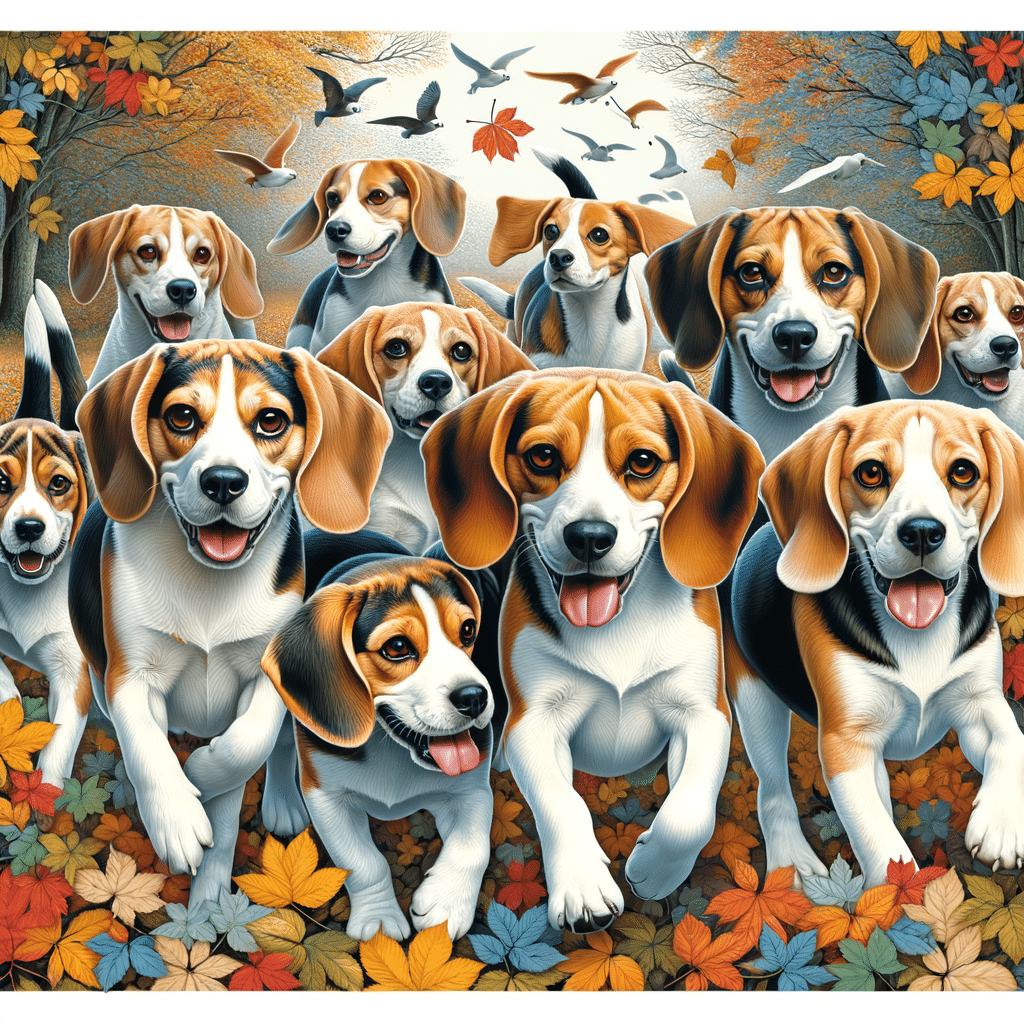Miniature beagle puppies, also called pocket beagles, are a smaller version of the standard beagle, beloved for their compact size and friendly temperament. Historically, beagles were bred for hunting due to their keen sense of smell and native tracking instincts. The emergence of the pocket beagle caters to the desire for a dog with these characteristics but in size more suitable for varied living environments, including apartments. Despite their smaller stature‚ these miniaturized versions retain the charming qualities of the standard beagle.
In This Article
Breeders achieve the miniature size through selective breeding practices, which may include the pairing of smaller beagles, introducing dwarfism, or choosing the smallest, known as runts, from a litter. As with any breed, prospective pocket beagle owners should know the breed’s health and care requirements. They require the same amount of love, attention, and responsibility as their larger counterparts, with a need for consistent exercise to maintain their health and happiness.
Highlights
- Pocket beagles retain the standard beagle's traits but in a more compact size.
- The breeding of miniature beagles involves selective practices for size reduction.
- Miniature beagles demand similar care, exercise, and attention as standard beagles.
Breed Overview
Miniature beagle puppies are a smaller version of the standard beagle breed known for their small size and friendly demeanor.
History and Heritage
Miniature beagles trace their lineage back to the small beagles used for hunting rabbits in England as early as the 13th century. These dogs were often called “glove beagles,” indicating their size was small enough to fit in a glove. Olde English pocket beagles call back to these early hunting hounds, sharing a resemblance to the larger Talbot Hound, an ancestral breed.
Characteristic Traits
The breed is distinguished by its amiable personality and strong prey drive, attributable to its heritage as a hunting hound. Beagles are generally intelligent and possess a playful yet determined temperament. Despite their size, they exhibit boldness and tenacity, which are common among larger hounds.
Breed Variations and Types
Pocket beagles generally refer to beagles that stand under 13 inches. There is also the Olde English pocket beagle, which attempts to recreate the historic breed. Beagle breed variations primarily only differ in size; the standard beagle can reach up to 15 inches or more.
Official Recognition
The American Kennel Club (AKC) recognizes the beagle as a breed. However, it does not officially recognize size variations like the miniature or pocket beagle. Specific registries, such as the Olde English Pocket Beagle Registry, may register these size varieties.
Comparison With Other Breeds
When compared to other small dog breeds such as chihuahuas, dachshunds, or Yorkshire terriers, miniature beagles are more similar to their traditional beagle counterparts‚ displaying a similar disposition and hunting prowess but in a more compact form.
Choosing the Right Beagle
Choosing a beagle involves more than size preference; it includes understanding the breed’s needs and predispositions. Beagles are prone to glaucoma, hip dysplasia, and luxating patella. Selecting a responsible breeder who utilizes certified breeding stock to minimize health risks is crucial. Reputable breeders will ensure transparency about their breeding practices and ensure the welfare of the dogs over profit.
Care and Management
When caring for miniature beagle puppies, it is crucial to address their feeding and nutrition, exercise and activity levels, health and wellness, training and socialization, and grooming needs. Each aspect is tailored to their size, energy, and temperament.
Feeding and Nutrition
A miniature beagle requires a balanced diet appropriate for its smaller size.
It is essential to provide them with:
- High-quality dog food: Get a brand formulated for small breeds with the right calorie content to prevent overfeeding.
- Consistent feeding schedule: Feeding them twice daily can help manage energy levels and prevent obesity.
Exercise and Activity Levels
Despite their compact size, miniature beagles are energetic and need consistent daily exercise to maintain their health.
- Daily walks: At least 20 minutes, twice daily, tailored to their size and energy.
- Playtime: Engage them with interactive games like fetch to stimulate them mentally and physically.
Health and Wellness
Miniature beagles can be prone to specific health issues, which include:
- Glaucoma: Regular eye checks can help catch this issue early.
- Hip Dysplasia and Luxating Patella: Monitoring for signs of discomfort during exercise is important.
Regular check-ups with the vet are necessary to maintain their overall well-being.
Training and Socialization
Training and socializing miniature beagles capitalize on their intelligence and prevent separation anxiety.
- Early socialization: Introduce them to various environments, people, and other dogs.
- Consistent obedience training: Train them with positive reinforcement techniques to encourage good behavior.
Grooming Needs
Proper grooming for miniature beagles involves:
- Regular brushing: Helps manage shedding and keep their coat healthy.
- Routine care: Includes ear cleaning, nail trimming, and dental care to prevent common issues.
Following these care and management practices can ensure your miniature beagle’s healthy and happy life.
Lifestyle Considerations
Potential owners should consider how a miniature beagle will fit into their lifestyle. These dogs have distinct needs regarding living conditions, family dynamics, and behavioral characteristics.
Adaptability to Living Conditions
Due to their small size, miniature beagles are adaptable to various living conditions. Typically, an adult miniature beagle weighs 15-18 pounds. Their smaller stature makes them a great choice for apartment living, although they still require adequate space to play and exercise. Owners must provide daily activities to keep these energetic canines fit and prevent boredom.
- Space Requirements: Moderate; a small yard or nearby park is beneficial.
- Recommended Exercise: 1-2 daily walks and play sessions to maintain physical health.
Compatibility with Families
Miniature beagles are known for their family-friendly temperament, exhibiting playful and affectionate behavior. They generally get along well with children and can make excellent companions due to their loving nature. However, they need proper socialization from a young age to ensure they are comfortable around various people and environments.
- Kid-Friendly: Yes, with supervision and appropriate interaction.
- Companionship: Thrive with the company, prone to separation anxiety if left alone too long.
Behavioral Tendencies
The temperament of miniature beagles leans towards being smart, funny, and sweet, making them delightful pets. Yet, they may exhibit behavioral tendencies, such as barking, which can be moderated with consistent training. Their intelligence makes them trainable, but they also need mental stimulation to stave off mischief.
- Barking: Can be vocally expressive; training can help manage noise levels.
- Separation Anxiety Can occur; regular companionship and attention are necessary.
Owners should ensure that a miniature beagle’s energetic disposition is met with sufficient exercise, social interaction, and mental engagement to foster a happy and healthy life within the family.
Breed Resourcing
Choosing the right source for a miniature beagle puppy, often called a pocket beagle, requires careful consideration of the breeder’s reputation, adoption avenues, litter availability, and cost.
Finding a Reputable Breeder
When searching for pocket beagle breeders, it is critical to identify those that are certified and state-inspected. Prospective owners should seek breeders who offer transparency, allowing for viewing pictures, videos, and, if possible, in-person visits.
Breeders should provide detailed histories of the puppies, including health clearances and parental lineage, affirming their commitment to ethical breeding practices.
Rescue and Adoption Options
Rescue organizations and shelters can be viable, too, though it may take longer to find the breed you want. Adopting from rescue centers provides a home for a dog in need. It often includes spaying or neutering, vaccinations, and a health assessment. Adoption offers a chance to support animal welfare and find a loyal companion.
Litter and Puppy Availability
Beagle puppies may only be available at specific times from reputable breeders as they often have waiting lists. Timing and patience are key in acquiring a pup from a planned litter. Always verify litter information and the expected timeframe to ensure the breeder meets your schedule and availability expectations.
Cost Considerations
The cost of a miniature beagle puppy varies based on factors like the breeder’s reputation, geographic location, and the pup’s lineage. Initial costs encompass more than the purchase price—potential owners should budget for food, veterinary care, training, and other supplies. Understanding all costs upfront is important to prepare for the financial aspect of dog ownership.
Frequently Asked Questions
This section addresses common inquiries regarding miniature beagle puppies, providing clear and factual answers to assist potential owners.
What is the typical size and weight of a fully-grown miniature beagle?
A fully-grown miniature beagle typically measures up to 13 inches at the shoulder and weighs between 15 to 18 pounds, making them smaller than standard beagles.
Are pocket beagles considered rare, and how do they differ from standard beagles?
Pocket beagles are relatively rare and are a smaller version of the standard beagle, historically bred for hunting due to their compact size. Other than their size, they are similar to standard beagles in personality, needs, and care.
What is the common temperament of miniature beagle puppies?
Miniature beagle puppies are known for their playful nature and curiosity. They are friendly and sociable dogs that get along well with children and other pets.
How long is the expected lifespan of a pocket beagle, and what health issues should potential owners be aware of?
A pocket beagle’s life expectancy is around 12 to 15 years. Potential owners should be watchful for health issues such as epilepsy, hypothyroidism, and patellar luxation, which can affect this breed.
What are the key considerations when looking to adopt a miniature beagle puppy?
When adopting a miniature beagle puppy, consider the breeder’s reputation, verify health clearances for the parents, and the cost. Also, be prepared for the active breed’s energy levels and exercise needs.






